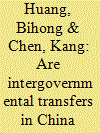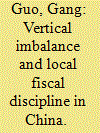|
|
|
Sort Order |
|
|
|
Items / Page
|
|
|
|
|
|
|
| Srl | Item |
| 1 |
ID:
128151


|
|
|
|
|
| Publication |
2012.
|
| Summary/Abstract |
Since 1994, China's central government has implemented a sequence of fiscal recentralization measures to increase its equalization capacity and reduce regional income disparities. However, the effect of intergovernmental transfers on equalization has been called into question by anecdotal evidence that seems to suggest that transfers from the center are not rule-based and are subject to heavy rent-seeking. Unlike past studies, which have focused on the equalization effects of total fiscal transfers from the center, this paper includes an examination of the equalization effects of different types of transfers because some transfers, which are inherently anti-equalizing, may mask the equalization effects of other types of transfers when they are lumped together to find the "average" effect. Using inequality measures, a decomposition of fiscal disparities, and dynamic panel data models, we find that China's intergovernmental transfer system that was established in 1994 does have some equalizing elements. To a large extent, these elements exist due to the mechanism designed to shrink the tax rebates that bear the legacy of the pre-1994 system; to a small extent, these elements exist due to the rule-based general-purpose transfer whose share in total transfers remains small but has increased since 2002. However, the equalization effects of the largest component of transfers, specific-purpose transfers, are anti-equalizing. They are typically not rule-based and thus subject to political influence. As a result, total transfers also exhibit significant anti-equalization effects.
|
|
|
|
|
|
|
|
|
|
|
|
|
|
|
|
| 2 |
ID:
143443


|
|
|
|
|
| Summary/Abstract |
Intergovernmental transfers are an important source of local public goods and services provision in many developing countries. Yet the empirical evidence on their effectiveness remains inconclusive partly because transfers are endogenous to political influence. This paper investigates the impact of a mix of intergovernmental transfers from a large-scale poverty relief program on local education spending in China between 1994 and 2000. Using a fuzzy regression discontinuity design, I first show no systematic evidence that counties benefiting from the program enhanced local education spending during the period of program implementation. I further show that the program has neither short-term nor long-term impacts on illiteracy reduction for the targeted counties.
|
|
|
|
|
|
|
|
|
|
|
|
|
|
|
|
| 3 |
ID:
179134


|
|
|
|
|
| Summary/Abstract |
Given that most local governments in Indonesia depend heavily on intergovernmental transfers, this study tries to examine whether Dana Alokasi Umum (DAU, or general allocation fund) is able to absorb a revenue shock from the fluctuation of Pendapatan Asli Daerah (PAD, or local government revenue). The results suggest that DAU does, in fact, absorb around 83 per cent of the revenue shock. This share is greater than the compensation rate determined by the allocation formula employed in the Indonesian intergovernmental transfers system set annually by the Directorate General of Fiscal Balance, Ministry of Finance. Once the differences among local government levels are considered, it is found that DAU covers PAD decrease across all levels of local government throughout the country, but the extent of coverage depends on a number of criteria.
|
|
|
|
|
|
|
|
|
|
|
|
|
|
|
|
| 4 |
ID:
162891


|
|
|
|
|
| Summary/Abstract |
Oil and gas pipeline leaks are the responsibility of a wide range of stakeholders including utilities, the public, construction firms and state safety program personnel. As a result, in the United State, state pipeline safety programs focus heavily on public education, outreach, and stakeholder participation so as to reduce the occurrence of these events. The US Pipeline & Hazardous Materials Safety Administration (PHMSA) directs federal support to state safety efforts through formula and project grant programs for state and local agencies that emphasize different aspects of collaboration. We combine these grant data with nationwide, longitudinal records on pipeline leaks, and use a multilevel Bayesian model to evaluate how different grant emphases relate to subsequent incident rates. State damage prevention grants are not associated with reductions in leaks but are associated with improvements in error recognition. Pipeline incidents are downstream from safety programs and impacts and identifying, minimizing, and correcting leaks requires states to motivate utility actions while also attempting to improve public awareness. This makes assessment of safety outcomes a challenge without better tracking of safety program communications and participation. In conclusion, we suggest improvements to data provision by states that could provide improved evidence for assessing safety improvements.
|
|
|
|
|
|
|
|
|
|
|
|
|
|
|
|
| 5 |
ID:
118971


|
|
|
|
|
| Publication |
2012.
|
| Summary/Abstract |
This article uses a regression discontinuity design in close electoral races to disclose purely political reasons in the allocation of intergovernmental transfers in a federal state. We identify the effect of political alignment on federal transfers to municipal governments in Brazil, and find that-in preelection years-municipalities in which the mayor is affiliated with the coalition (and especially with the political party) of the Brazilian president receive approximately one-third larger discretionary transfers for infrastructures. This effect is primarily driven by the fact that the federal government penalizes municipalities run by mayors from the opposition coalition who won by a narrow margin, thereby tying their hands for the next election.
|
|
|
|
|
|
|
|
|
|
|
|
|
|
|
|
| 6 |
ID:
082031


|
|
|
|
|
| Publication |
2008.
|
| Summary/Abstract |
This article examines local fiscal behavior in contemporary China against the backdrop of decentralized spending responsibilities and recentralized revenues. Vertical imbalance after the 1994 tax-sharing system reform, coupled with other features of the fiscal institutions, is not conducive to conservative local fiscal behavior. Moreover, a main driving force behind the expansion of local governments is the politically motivated intergovernmental transfer scheme. The center in effect "buys" political stability in sensitive areas while holding local leaders accountable for their tax efforts. A dynamic panel analysis of Chinese counties reveals that a million-yuan increase in general transfer payment and salary raise subsidies would add, respectively, fifteen and sixteen employees to the county government payroll, other things being equal. At the same time, increased subsidies from upper-level governments do not "crowd out" or significantly affect local tax effort. Additional dynamic panel data analysis at the provincial level produced similar findings
|
|
|
|
|
|
|
|
|
|
|
|
|
|
|
|
|
|
|
|
|